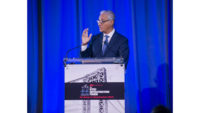Parsons Reports 2023 Profit of $161M as Government Security Technology Work Grows

ENR tracks the financial performance of key engineering and construction contractors.
Image; Zerbor/iStock/Getty Images Plus
Parsons Corp., one of a handful of government contractors that stands to benefit from both the increasing need for military and security technology and non-military infrastructure, reported 2023 year-end net income of $161 million on revenue of $5.4 billion.
In 2022, the company netted $97 million on revenue of $4.19 billion.
For its final quarter of last year, the Chantilly, Va.-based company reported net income of $45 million on revenue of $1.5 billion, compared to $28 million on $1.1 billion for the same period in 2022, capping a solid year. Parsons' share price (PSN-NYSE) closed on Feb. 21 at about $75.29, way above its low for the past year of $40.61.
The performance reaffirmed the company's basic business model and strategy almost five years after it raised $500 million in a May 2019 stock offering. Prior to that, it had operated for many years as a privately-held company.
In recent years Parsons successfully shifted its identity to that of a technology company rather than a construction engineer and contractor, fields where it still has substantial business.
In December, Parsons enthusiastically announced that S&P Dow Jones Indices had changed the company's classification code to "research and consulting services, acknowledging its status as a leading professional services provider."
Most of the 2023 revenue increase came from ramp-up of recent contract wins and growth of existing contracts, the company reported. Acquisitions added about $274 million.
Demand for Parsons' critical Infrastructure services as an engineer and contractor remains strong in its three geographic markets: the U.S., Canada and Middle East.
But in 2017, when current CEO Carey Smith headed Parsons's federal business unit, she told the online publication Washington Technology: “If you look at where the market is going [in the future], it’s basically converged security: combining cyber and physical security into solutions."
More recently, Smith said on a Feb. 14 results call with investors that Parsons’ core defense markets are "growing at mid-to-high single digits."
She said: "Given world-wide geopolitical events, we continue to see strong demand for our solutions, including cyber, electronic warfare, signals collection, space, missile defense and critical Infrastructure protection."





